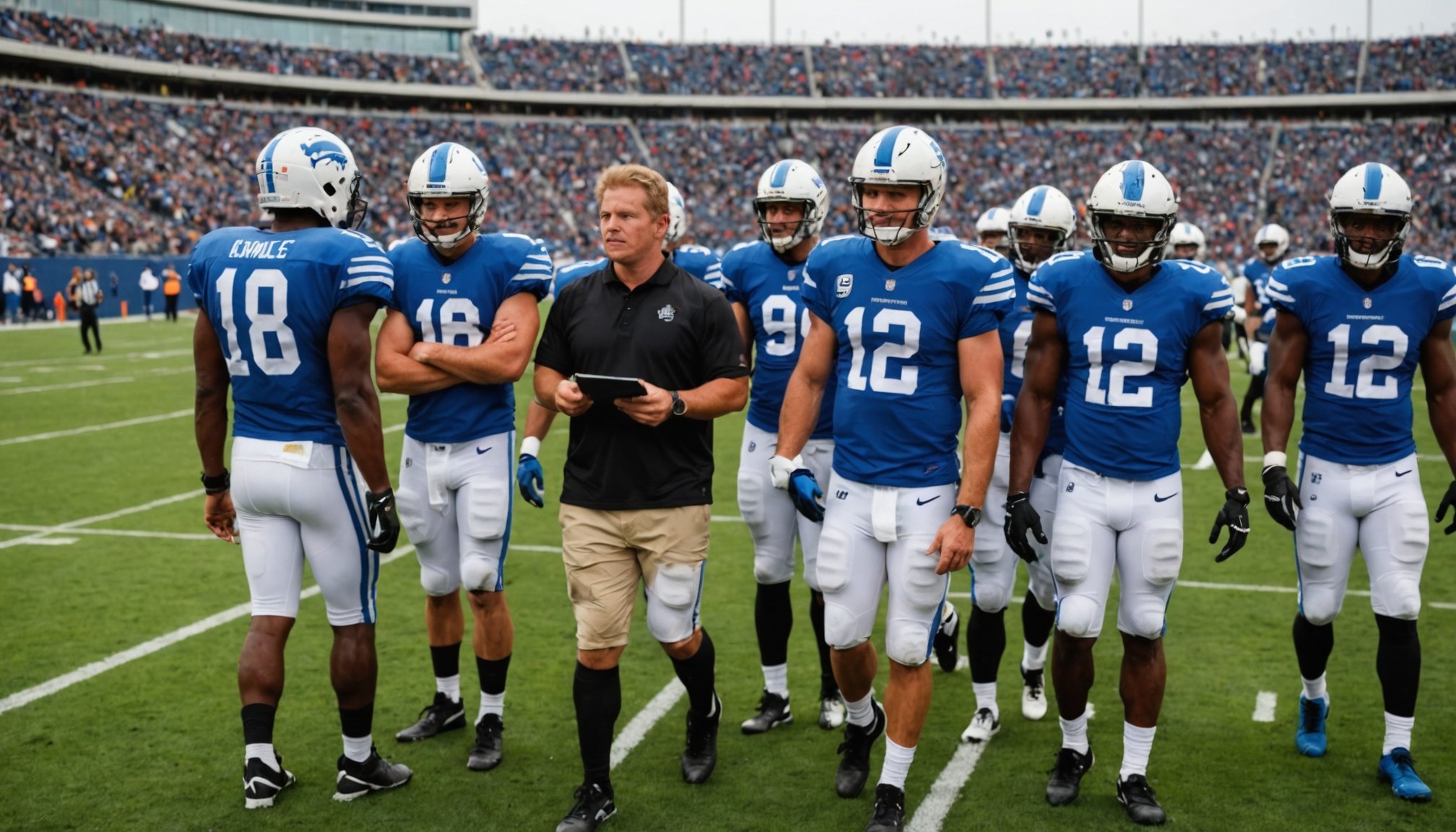Winning Minds: Effective Techniques to Inspire Football Players During Challenging Losing Spells
Understanding the Challenge
When a football team is in the midst of a losing streak, it can be a daunting task for coaches and players alike to maintain morale and motivation. The pressure to perform, combined with the disappointment of repeated losses, can erode the team’s confidence and overall performance. However, there are several effective techniques that coaches can employ to inspire their players and turn the tide.
Building Mental Toughness
Mental toughness is a crucial aspect of any sports team, especially in football where physical and mental demands are high. Here are some strategies to build mental toughness:
Also to discover : Unleash your inner pro: essential techniques to enhance free kick accuracy in football
Goal Setting
Setting clear, achievable goals is essential for maintaining focus and motivation. Coaches should work with players to set both short-term and long-term goals. For example, a short-term goal might be to win the next game, while a long-term goal could be to make the playoffs.
- **Short-term goals:**
- Win the next game
- Improve specific skills (e.g., passing accuracy, defensive tackles)
- Enhance team cohesion
- **Long-term goals:**
- Make the playoffs
- Win the championship
- Develop a winning mindset
Positive Reinforcement
Positive reinforcement is a powerful tool in building mental toughness. Coaches should praise players for their efforts and achievements, no matter how small. This helps to boost self-esteem and maintain a positive attitude.
Topic to read : Effective techniques for football academies to boost technical skill development in young players
"Positive reinforcement is key. When players feel valued and appreciated, they are more likely to perform at their best," says John Smith, a veteran football coach.
Visualization Techniques
Visualization is a technique used by many athletes to prepare mentally for games. Coaches can guide players through visualization exercises where they imagine themselves performing well on the field. This can help build confidence and mental toughness.
Fostering Team Cohesion
Team cohesion is vital for any successful football team. Here are some ways to foster it:
Team-Building Activities
Organizing team-building activities outside of regular training sessions can help players bond and build trust in each other. This could include team outings, volunteer work, or even simple social gatherings.
Open Communication
Encouraging open communication among team members and between players and coaches is crucial. This helps to resolve conflicts and ensures that everyone is on the same page.
- **Team-building activities:**
- Volunteer work
- Social gatherings
- Team outings
- **Open communication:**
- Regular team meetings
- One-on-one sessions with coaches
- Anonymous feedback mechanisms
Celebrating Small Wins
Celebrating small victories, even during a losing streak, can help maintain morale. This could be something as simple as acknowledging a player’s hard work or a team’s improved performance in a particular area.
Enhancing Physical and Mental Health
The physical and mental health of athletes is paramount, especially during challenging times.
Balanced Training
Coaches need to ensure that training sessions are balanced, focusing not only on physical conditioning but also on mental health. This includes incorporating rest days, recovery sessions, and mental health check-ins.
| Aspect | Description |
|
|-----------------------------------------------------------------------------|
| **Physical Conditioning** | Focus on strength, endurance, and agility training. |
| **Mental Health** | Include stress management, mindfulness, and mental toughness exercises.|
| **Rest and Recovery** | Ensure adequate rest days and recovery sessions. |
Nutrition and Sleep
Proper nutrition and adequate sleep are essential for both physical and mental performance. Coaches should educate players on the importance of a balanced diet and sufficient sleep.
"A well-rested and well-nourished athlete is a better performer. It's not just about the physical aspect; it's also about mental clarity and focus," notes Dr. Jane Doe, a sports nutritionist.
Case Study: Jacques Dussault and the Concordes de Montréal
Jacques Dussault, a former coach of the Concordes de Montréal, faced significant challenges during his tenure. Here’s how he managed to inspire his team despite adversity:
Unconventional Relationships
Dussault built unconventional relationships with his players, which helped in fostering a sense of camaraderie and trust. He appreciated the support of veteran players like Glen Weir and engaged in promotional events to boost team morale[1].
Program Conditioning
Dussault emphasized the importance of a robust conditioning program between seasons. This not only improved physical performance but also boosted mental toughness as players felt more prepared for the challenges ahead[1].
Dealing with Injuries
When key players like Doug Scott were injured, Dussault had to adapt quickly. He focused on developing younger players and ensuring the team remained cohesive despite the setbacks[1].
Practical Insights and Actionable Advice
Here are some practical tips for coaches to inspire their players during a losing streak:
Lead by Example
Coaches should lead by example, demonstrating the same level of commitment and positivity they expect from their players.
Focus on the Process
Rather than focusing solely on the outcome, coaches should emphasize the process of improvement. Celebrate small victories and acknowledge progress.
Keep it Fun
Football is a game, and it should remain enjoyable. Incorporate fun elements into training sessions to keep players engaged and motivated.
- **Lead by example:**
- Show commitment and positivity
- Be approachable and supportive
- **Focus on the process:**
- Celebrate small victories
- Acknowledge progress
- **Keep it fun:**
- Incorporate fun elements into training
- Make the game enjoyable
Inspiring football players during a losing streak requires a multifaceted approach. By building mental toughness, fostering team cohesion, enhancing physical and mental health, and leading by example, coaches can help their teams navigate challenging times. Remember, it’s not just about winning games; it’s about developing a winning mindset that can sustain teams over the long term.
"A winning mindset is not just about winning games; it's about the journey, the hard work, and the resilience. When you focus on these aspects, the wins will follow," says Mike Johnson, a high school football coach.











